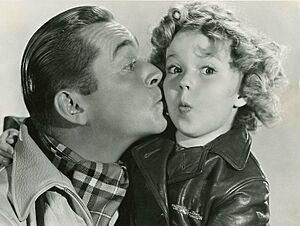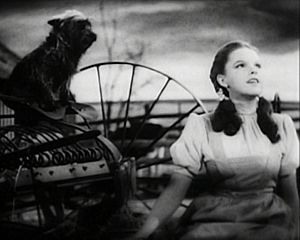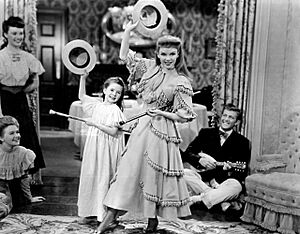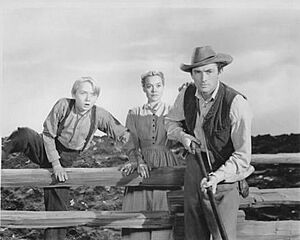Academy Juvenile Award facts for kids
Quick facts for kids Academy Juvenile Award |
|
|---|---|
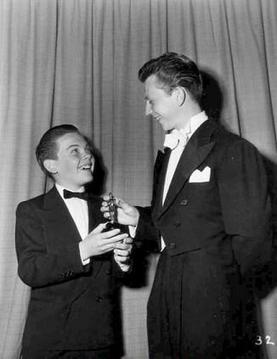
Bobby Driscoll accepting the Juvenile Award
|
|
| Presented by | Academy of Motion Picture Arts and Sciences |
| Country | United States |
| First awarded | February 27, 1935 |
| Last awarded | April 17, 1961 |
The Academy Juvenile Award, also known as the Juvenile Oscar, was a special award given by the Academy of Motion Picture Arts and Sciences (AMPAS). It was created to celebrate young actors and actresses under 18. These young performers were honored for their "outstanding contributions to screen entertainment."
The first Juvenile Oscar was given to 6-year-old Shirley Temple in 1935. This was for her amazing work in movies during 1934. Over the next 26 years, 12 child actors received this award. The last Juvenile Oscar was given in 1961 to 14-year-old Hayley Mills. She received the small Oscar statue for her role in the 1960 film Pollyanna.
The trophy itself was a smaller version of the famous Oscar statue. It stood about seven inches tall. This is about half the size of the regular 13.5-inch Oscar trophy.
Contents
Special Academy Awards
The Academy of Motion Picture Arts and Sciences (AMPAS) gives out regular Academy Awards for different movie achievements. But they also give out "Special" or "Honorary" Academy Awards. These awards are usually given each year by the Academy's leaders. They celebrate movie achievements that don't fit into the usual award categories.
This is why the awards for young actors from 1934 to 1960 were created. These were informally called the "Juvenile Academy Awards."
The very first "Special Awards" were given at the 1st Academy Awards in 1929. These celebrated films from 1927 and 1928. The first Special Awards went to Charlie Chaplin for The Circus and to Warner Bros. for The Jazz Singer. Later, starting with the 23rd Academy Awards in 1950, these "Special Awards" were officially renamed "Honorary Awards." These Honorary Awards are still given today. However, the "Juvenile Academy Award" itself is no longer given out.
History of the Juvenile Oscar
The Academy Awards started on May 16, 1929. At first, there was no special award for young actors. The first child actor to be nominated for a regular Oscar was 9-year-old Jackie Cooper. He was nominated for Best Actor in 1931 for his movie Skippy. But Cooper did not win that year.
The Academy realized that child actors might be at a disadvantage. They were competing against adult actors in the Best Actor and Best Actress categories. Also, there were no categories yet for Best Supporting Actor or Supporting Actress. So, the Academy decided to create a special "Honorary Award" just for young people under 18. This award would recognize their great work in movies.
On February 27, 1935, the 7th Academy Awards became the first ceremony to give out the Special Juvenile Award. Bob Hope jokingly called the small statue the "Oscarette" in 1945. The statue was a tiny Oscar. It showed a knight holding a sword and standing on a film reel. This small trophy was about half the size of the full Oscar. It stayed the same throughout the award's history, with only small changes to its base.
After 1935, the Special Juvenile Award was given out from time to time. A total of 12 young actors and actresses received it over 26 years. However, some young actors were nominated in the regular Best Supporting Actor/Actress categories during this time. For example, 14-year-old Bonita Granville was nominated in 1936. Also, 11-year-old Brandon deWilde was nominated in 1953. These young nominees, however, lost to adult actors in their categories.
The 33rd Academy Awards, held on April 17, 1961, was the last time the Honorary Juvenile Award was given.
Honorees of the Academy Juvenile Award
1930s Honorees
The 7th Academy Awards honored Shirley Temple with the first Juvenile Award. This was for her "outstanding contribution to screen entertainment during the year 1934." Shirley started her film career at age three. In 1934, she became a huge child star in movies like Little Miss Marker and Bright Eyes. She was six years old when she accepted her award. Shirley Temple is the youngest person ever to receive an honor from the Academy.
The 11th Academy Awards honored both Deanna Durbin and Mickey Rooney. They received the Juvenile Award for "bringing to the screen the spirit and personification of youth." By 1938, 16-year-old Durbin was a rising star. She sang in movies like Mad About Music. Rooney, 18, was famous for the Andy Hardy comedies. He also earned praise for his role in Boys Town. Mickey Rooney was the oldest person to receive the Academy's Juvenile Award.
The 12th Academy Awards honored Judy Garland for her "outstanding performance as a screen juvenile during the past year." In 1939, 16-year-old Garland became one of Hollywood's brightest young stars. That year, she appeared in the MGM musicals Babes in Arms and The Wizard of Oz. The Juvenile Award was the only honor Judy Garland received from the Academy.
1940s Honorees
The 17th Academy Awards honored Margaret O'Brien as "outstanding child actress of 1944." That year, 7-year-old O'Brien was one of the most popular child actresses. She starred in films like The Canterville Ghost and Meet Me In St. Louis. Bob Hope, who hosted the ceremony, called the Juvenile Award the "Oscarette" when he gave O'Brien her miniature Oscar.
The 18th Academy Awards honored Peggy Ann Garner as "outstanding child actress of 1945." Peggy Ann started her film career at age six. In 1945, 13-year-old Garner appeared in Nob Hill. She also received great reviews for her role in A Tree Grows in Brooklyn.
The 19th Academy Awards honored Claude Jarman Jr. as "outstanding child actor of 1946." Twelve-year-old Jarman received the Juvenile Oscar for his very first movie role. He played Jody in the MGM family drama, The Yearling. Former recipient Shirley Temple presented the award to him.
The 21st Academy Awards honored Ivan Jandl for his "outstanding juvenile performance of 1948." He played 'Karel Malik' in The Search. Ivan was born in Czechoslovakia. He was the first foreign child actor to receive the Juvenile Oscar. He could not travel to the United States for the ceremony. So, his statue was given to him in his home city of Prague.
The 22nd Academy Awards honored Bobby Driscoll as "the outstanding juvenile actor of 1949." That year, 12-year-old Driscoll starred in the Disney film So Dear to My Heart. He also earned praise for his role in the drama The Window. Bobby was very excited when he accepted his small statue. He said, "I don't ever think I've been so thrilled in my life."
1950s and 1960 Honorees
The 27th Academy Awards honored both Jon Whiteley and Vincent Winter. They received the Juvenile Award for their "outstanding juvenile performance(s) in The Little Kidnappers." In 1953, Whiteley, age 8, and Winter, age 6, played two boys living in Nova Scotia. They "kidnap" a baby and care for it in this British family drama.
The 33rd Academy Awards honored Hayley Mills. This was the last Juvenile Award ever given. She was honored for her performance in Pollyanna as "the most outstanding juvenile performance during 1960." Hayley made her acting debut at age twelve. In 1960, 13-year-old Mills made her Disney debut as Pollyanna. This role also earned her a BAFTA Award nomination.
List of Honorees
| Honorees of the Academy Juvenile Award 1934 – 1960 |
||||
|---|---|---|---|---|
| Year | Ceremony | Name | Age | Honor |
| 1934 | 7th | Shirley Temple | 6 years, 310 days | To Shirley Temple, in grateful recognition of her outstanding contribution to screen entertainment during the year 1934. |
| 1938 | 11th | Deanna Durbin | 17 years, 81 days | To Deanna Durbin and Mickey Rooney for their significant contribution in bringing to the screen the spirit and personification of youth, and as juvenile players setting a high standard of ability and achievement. |
| Mickey Rooney | 18 years, 153 days | |||
| 1939 | 12th | Judy Garland | 17 years, 264 days | To Judy Garland for her outstanding performance as a screen juvenile during the past year. |
| 1944 | 17th | Margaret O'Brien | 8 years, 59 days | To Margaret O'Brien, outstanding child actress of 1944. |
| 1945 | 18th | Peggy Ann Garner | 14 years, 32 days | To Peggy Ann Garner, outstanding child actress of 1945. |
| 1946 | 19th | Claude Jarman, Jr. | 12 years, 167 days | To Claude Jarman, Jr., outstanding child actor of 1946. |
| 1948 | 21st | Ivan Jandl | 12 years, 59 days | To Ivan Jandl, for the outstanding juvenile performance of 1948, as "Karel Malik" in The Search. |
| 1949 | 22nd | Bobby Driscoll | 13 years, 20 days | To Bobby Driscoll, as the outstanding juvenile actor of 1949. |
| 1954 | 27th | Jon Whiteley | 10 years, 39 days | To Jon Whiteley for his outstanding juvenile performance in The Little Kidnappers. |
| Vincent Winter | 7 years, 91 days | To Vincent Winter for his outstanding juvenile performance in The Little Kidnappers. | ||
| 1960 | 33rd | Hayley Mills | 14 years, 364 days | To Hayley Mills for Pollyanna, the most outstanding juvenile performance during 1960. |
| 10 Years |
10 Ceremonies |
12 Honorees |
13 Average Age |
Column Totals |
After the Juvenile Award Era
In 1962, 16-year-old Patty Duke starred in The Miracle Worker. In 1963, she won the Academy Award for Best Supporting Actress for her role. She became the youngest actress at that time to win a regular Academy Award. This showed that young actors could win in competitive categories. From then on, child actors were recognized in regular categories alongside adults, or not at all.
As of 2022, three young actors (including Patty Duke) have won regular Oscars. All of them won in the Best Supporting Actress category. The other two are Tatum O'Neal, who was 10, for Paper Moon (1973). And Anna Paquin, who was 11, for The Piano (1993). Tatum O'Neal is still the youngest person to win a competitive Academy Award.
Lost, Stolen, and Found Awards
Only 12 actors and actresses received the small Juvenile Oscar. But 14 of these awards are known to exist.
Judy Garland's Lost Award
Judy Garland reportedly lost her award over the years. In 1958, she asked the Academy for a new one. The Academy agreed. But they asked her to sign an agreement. This agreement said that if Oscar winners or their families want to sell their statues, they must first offer to sell them back to the Academy for a small fee.
After Judy Garland passed away in 1969, her former husband, Sidney Luft, tried to sell a small Oscar statue. The Academy found out and stopped the sale. They discovered it was Garland's replacement Oscar from 1958. A court ruled in the Academy's favor. Luft was told to return the statue to the Academy. He gave it to his daughter, Lorna Luft, who wanted to keep it.
In 2000, another statue was put up for sale. The Academy realized this was Garland's original 1940 Oscar. The Academy again took legal action. They won the case, and Luft was ordered to give the 1940 statue to the Academy. In 2010, Garland's original 1940 Juvenile Oscar was shown to the public in New York City. As of 2020, her 1958 replacement award is believed to be with her family.
Margaret O'Brien's Stolen Award
Margaret O'Brien used to display her awards in a special room. In 1954, the family's maid took O'Brien's Juvenile Oscar and two other awards to polish them. The maid never returned. O'Brien's mother passed away shortly after. Margaret, then 17, forgot about the maid and the Oscar for a while. When she tried to find the maid later, she had moved.
Years later, the Academy gave O'Brien a replacement Oscar. But O'Brien still hoped to find her original award. She looked at memorabilia shows and antique shops. In 1995, someone found a small Oscar with Margaret O'Brien's name on it in an auction catalog. This led to the discovery of the long-lost Oscar.
Two collectors, Steve Neimand and Mark Nash, found the Oscar at a flea market in 1995. They bought it for $500. When they learned the award's history, they agreed to return it to O'Brien. On February 7, 1995, almost 50 years after she first received it, the Academy held a special ceremony. They returned the stolen award to Margaret O'Brien. She told reporters:
- "For all those people who have lost or misplaced something that was dear to them, as I have, never give up the dream of searching – never let go of the hope that you'll find it because after all these many years, at last, my Oscar has been returned to me."
Hayley Mills' Stolen Award
Hayley Mills was filming a TV show in California in the late 1980s. When she went back home to London, her Oscar was gone. Hayley was the last person to win a miniature Oscar. She was told that the mold for the small Oscars had been broken. This meant a new miniature one could not be made. In 2022, the Academy president, David Rubin, surprised Mills with a full-sized replacement Oscar statue.
See also
 In Spanish: Premio Juvenil de la Academia para niños
In Spanish: Premio Juvenil de la Academia para niños
- Academy Award (Oscar)
- Academy of Motion Picture Arts and Sciences (AMPAS)
- Child actor
- Honorary Academy Award
- List of oldest and youngest Academy Award winners and nominees
- Young Artist Award


